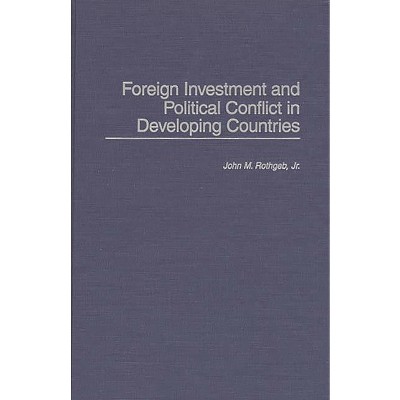Civil-Military Relationships in Developing Countries - by Dhirendra K Vajpeyi & Glen Segell (Hardcover)

$133.00 when purchased online
Target Online store #3991
About this item
Highlights
- Civil-Military Relationships in Developing Countries analyzes the crucial links between security, democratization, economic development, and state building institutions.
- About the Author: Dhirendra Vajpeyi is professor of political science at the University of Northern Iowa.
- 222 Pages
- Political Science, International Relations
Description
About the Book
Civil-Military Relationships in Developing Countries analyzes the crucial links between security, democratization, economic development, and state building institutions. With studies of fourteen countries in Asia, the Middle East, and Africa, this book provides a comprehensive...Book Synopsis
Civil-Military Relationships in Developing Countries analyzes the crucial links between security, democratization, economic development, and state building institutions. With studies of fourteen countries in Asia, the Middle East, and Africa, this book provides a comprehensive analysis that offers a new understanding of civil-military relations.Review Quotes
Civil-Military Relationships in Developing Countries is a rich contribution to our understanding of political roles that armed forces play. Its juxtaposition of contrasting cases from across the developing world brings to the fore how institutionalized government control of the armed forces can be inhibited by complex military-society interactions that span military corruption, ideological and religious tendencies within the armed forces, and the use of the military to repress civil unrest.
Dhirendra Vajpeyi and Glen Segell, together with five experts, deliver a comprehensive book which will certainly become a valuable resource to scholars, politicians, and military professionals. Mistakenly, the study of civil-military relations in developing countries brings to mind mainly coups d'état and civil wars. While this might have been true several decades ago, the current state-of-the-art of this field of study is very different, as this rich volume methodically clarifies.
The book includes distinct examples from almost twenty different developing countries in Asia, Africa, Latin America, and the Middle East. The assorted analyses provide a wide scope of civil-military relations: on the one hand, successful cases where the military institute takes upon itself nation-building missions--thus contributing and in fact enhancing the country's political development, modernization, and economic growth; and on the other hand, instances of destructive civil-military relations that result in political instability, economic stagnation, conflicts, and even bloody clashes between the armed forces and the civil society. The diligent reader will find here possible explanations to this diversity, as well as some clues for better decision-making.
In this exciting new anthology, Dhirenda K. Vajpeyi and Glen Segell have assembled a distinguished group of scholars to analyze current aspects of civil-military relations (CMR) in key developing countries. Both theoretically informed and substantively rich, the contributions to this volume shed new light on the ever-changing interplay between the state, society, and the military across a range of states, including several countries often overlooked in other studies. This excellent volume deserves a wide readership among students of developing countries and particularly those concerned with the role of militaries there.
Many developing countries are reconfiguring their civil-military relations, acknowledging the overlapping boundaries of development, poverty, and security. This book makes a significant contribution to our understanding of this complex situation, conveying that no single paradigm determines the role of the armed forces in a given country.
Segell and Vajpeyi's volume is an empirical goldmine. It deftly resuscitates a focus on developing countries that has been lost in the civil-military relations literature over the past decade. In doing so, it both situates these countries in the larger conceptual debate and incisively points out colonialism's corrosive legacy, fifty years on, for the relationship between development, security, and democratization.
The wave of military disengagement and the seeming civilizing of politics in developing countries, which began in the late 1970s, led to a dearth of scholarship on the subject; scholars appeared to assume that civilian control over the military was a reality, and the armed forces withdrew to the barracks to concentrate on their professional mission. Yet, a closer look reveals that the relations between the military and civilians moved from a model emanating from Mao's maxim of power flowing from the barrel of a gun to a contesting model in which the political and military elites compete and negotiate the distribution of power. The Vajpeyi and Segell compendium captures the pulse of this new reality and reignites interest in the study of civil-military relations in the developing world. The volume brings together an impressive array of well-chosen examples that focus on hitherto neglected countries, but also reexamines other cases that had occupied scholarly attention in the past. Future generations of scholars and practitioners alike will look back on this pioneering tome as a springboard and a very important foundation.
This book deals directly with some of the most intractable civil-military relations of our time and does so with a very clear and helpful 'debate' format in which each expert chapter is followed by editors' notes. Glen Segell's typology of the possible political outcomes of the broad phenomenon now known as the 'Arab Spring' is both perceptive and very effective. He sheds important light upon the requisites of democracy in the twenty-first century and the political options that stem from particular patterns of civil-military relations. Dhirendra Vajpeyi's analysis of the profoundly different systems in Pakistan and India sheds new light on those confusing conundra. Orlando Perez brings his extensive expertise to bear on the Central American countries, incorporating Alfred Stepan's concept of 'military prerogatives' to enhance our understanding of civil-military relations, and hence democracy, in these complex cases. Additional chapters by an impressive list of authors on Central American, Chinese, Indonesian, Nigerian, and Botswanan civil-military relations reinforce the impression that this book is a major contribution to civil-military relations, and thus to the often overlooked prerequisites to democracy, the dominant, but by no means permanently assured, political pattern of our age.
About the Author
Dhirendra Vajpeyi is professor of political science at the University of Northern Iowa. He is editor of Climate Change, Sustainable Development, and Human Security: A Comparative Analysis and Water Resource Conflict and International Security: A Global Perspective.
Glen Segell is lecturer at Bar-Ilan University and scientist at the Institute for National Security Studies, Tel-Aviv.Dimensions (Overall): 9.1 Inches (H) x 6.1 Inches (W) x 1.0 Inches (D)
Weight: 1.2 Pounds
Suggested Age: 22 Years and Up
Number of Pages: 222
Genre: Political Science
Sub-Genre: International Relations
Publisher: Lexington Books
Theme: General
Format: Hardcover
Author: Dhirendra K Vajpeyi & Glen Segell
Language: English
Street Date: December 16, 2013
TCIN: 1005135479
UPC: 9780739182802
Item Number (DPCI): 247-23-5043
Origin: Made in the USA or Imported
Shipping details
Estimated ship dimensions: 1 inches length x 6.1 inches width x 9.1 inches height
Estimated ship weight: 1.2 pounds
We regret that this item cannot be shipped to PO Boxes.
This item cannot be shipped to the following locations: American Samoa (see also separate entry under AS), Guam (see also separate entry under GU), Northern Mariana Islands, Puerto Rico (see also separate entry under PR), United States Minor Outlying Islands, Virgin Islands, U.S., APO/FPO
Return details
This item can be returned to any Target store or Target.com.
This item must be returned within 90 days of the date it was purchased in store, shipped, delivered by a Shipt shopper, or made ready for pickup.
See the return policy for complete information.











